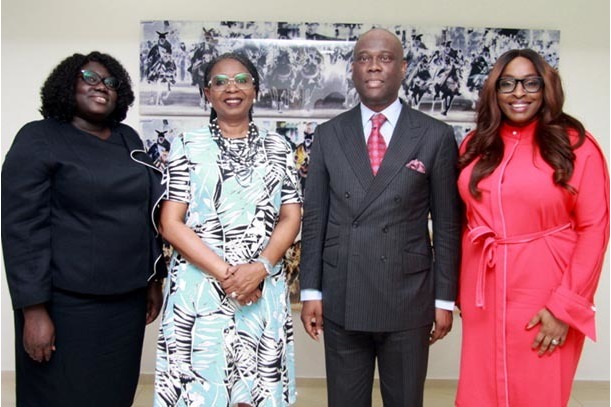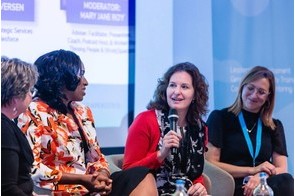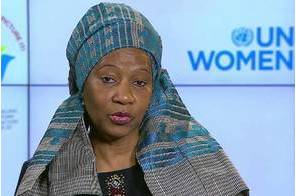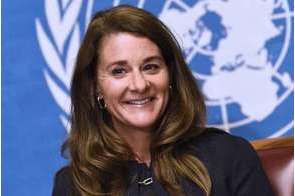Access Bank promoting gender equality in the financial services sector

Summary
The Central Bank of Nigeria recognises the fact that financial access, inclusion and literacy are the cornerstones of poverty reduction.
Facts and figures
Gender equality is achieved when women and men enjoy the same rights and opportunities across all sectors of society, including economic participation and decision-making. Equality of the genders entails the view that the aspirations and needs of women and men should be equally valued and favoured.
According to the United Nations (UN), “Gender equality is not only a fundamental human right, but a necessary foundation for a peaceful, prosperous and sustainable world.” Statistics from the UN indicate that globally, 750 million women and girls alive today were married before the age of 18 and at least 200 million women and girls in 30 countries have undergone female genital mutilation (FGM). Also, women have made important inroads into political offices across the world. Their representation in national parliaments – at 23.7 per cent – is still far from parity.
Globally, just 13 per cent of women are agricultural landholders; and more than 100 countries have taken actions to track budget allocations aimed at promoting gender equality. Women in Northern Africa hold less than one in five paid jobs in the non-agricultural sector. But globally, the proportion of women in paid employment outside the agriculture sector has increased from 35 per cent in 1990 to 41 per cent in 2015.
Unfortunately, the reality today is that women have fewer opportunities for economic participation than men. Women have less access to basic and higher education, greater health and safety risks, and less political representation. While progress has been made towards gender equality around the world, there’s still much grounds to cover – particularly in some countries, where governments have been trying to roll back women’s rights.
In Nigeria, the problem of gender inequality has existed for decades. Patriarchy, which is the biggest culprit for gender inequality, is very evident in Africa. It has been perpetuated for generations by religious beliefs and the diverse cultures. In the northern part of Nigeria, women are still largely subordinated to men, as women are only considered to be home-keepers and child-bearers.
Meeting the needs of women
The Central Bank of Nigeria (CBN) recognises the fact that financial access, inclusion and literacy are the cornerstones of poverty reduction. To this end, the apex bank has taken the lead in developing Nigeria’s National Financial Inclusion Strategy (NFIS) to ensure that a clear agenda is set to increase both access and usage of financial services. The NFIS articulates the challenges in financial inclusion and identifies areas of focus, key performance indicators (KPIs) and targets, and describes the implementation structure.
Indeed, the NFIS was developed with the aim to boost access to finance, specifically for excluded groups such as women and micro, small and medium-sized enterprise. The strategy provides for reducing the exclusion rate of women from 54 per cent to 20 per cent by the year 2020. To achieve this, special incentives and provisions would be made available to financial institutions to develop products that would meet the needs of Nigerian women.
The CBN, as part of its developmental efforts, supports Entrepreneurship Development Centres (EDC) in the six geo-political zones of the country. The apex bank places considerable focus on women in the implementation of these centres.
In 2012, the Bankers’ Committee, which comprises of the CBN, Nigerian Deposit Insurance Corporation (NDIC), Deposit Money-Banks and Discount Houses declared it the year of ‘Women Economic Empowerment.’ The Bankers’ Committee subsequently developed a dedicated sub-committee focused on women economic empowerment. One of the focus areas of this sub-committee was to facilitate the decision of the Committee to ensure that women occupy more leadership positions in the industry. The target was to increase women representation on Boards to 30 percent and 40 per cent at the senior management level by 2014.
As a result of this initiative, the industry has witnessed improvements in the number of women appointed as Board Chairs, Bank CEOs and women in management positions. However, despite this progress, it is clear that the industry is far from achieving the set goal.
Furthermore, in 2012, Access Bank initiated and championed the process that led to the development of the Nigerian Sustainable Banking Principles (NSBPs). This was achieved by working with key stakeholders of the banking industry, including the CBN, International Finance Corporation (IFC), amongst others.
The NSBPs are a set of nine (9) principles that now guide the entire banking industry to embed sustainability in business operations and practices. Today, Access Bank serves as the chair of the Nigerian Sustainable Banking Principles’ Implementation Steering Committee set up to guide, support and drive the banking industry to embed the nine NSBPs in the industry.
One of the principles of the NSBP’s (Principle 4) is hinged on ‘women’s Economic Empowerment’ and it aims to “promote women’s economic empowerment through a gender inclusive workplace culture in our Business Operations and seek to provide products and services designed specifically for women through our Business Activities.”
However, despite the strategic efforts and progress made by the banking industry to drive gender equality and women economic empowerment, the industry is still well on its way to achieve the set goal. It is, therefore, imperative that the industry continues to adopt new and innovative strategies that will enable the achievement of the overall goal of gender equality in the sector.
NSBP and gender equality
To this end, as part of the activities to commemorate the Fifth Anniversary of the Implementation of the Nigerian Sustainable Banking Principles, the NSBP’s Implementation Steering Committee as chaired by Access Bank, organized a capacity building session, titled: “Gender Equality in the Financial Services Sector.” The session was organised on Wednesday, September 19, 2018 and hosted by Access Bank.
The aim of the session was to promote the empowerment of female employees and drive gender inclusion in the leadership of Nigerian banks. It also stressed the need to identify and address the socio-cultural barriers perpetuating inequality.
The event featured keynote speakers, including Dr. Herbert Wigwe, GMD/CEO, Access Bank Plc; Ibukun Awosika, Chairperson, First Bank of Nigeria; Victoria Mojekwu, Director, Capacity Building, Central Bank of Nigeria, amongst others. The event also featured a panel discussion on the theme, “Driving Gender Equality in the Workplace.” The panellists included Foluke Aboderin, WIMBIZ; Ken Egbas, CEO, TruContact; Adebola Williams, Co-founder, Red Media; and Bekeme Masade, Executive Director, CSR-in-Action.
Speaking at the session, Hebert Wigwe, said: “The session is about strengthening gender equality as far as financial institutions are concerned but I would urge us to take it to a different level. Let us get people in manufacturing and other fields to basically embrace what is good for the entire world, in this case we are talking about gender equality. The Nigerian Sustainability Banking Principles have come a long way from where we started from five years ago. But there are still several institutions that have not attained the level of compliance that we would expect, particularly as it pertains to gender equality.”
Also speaking at the event, Chizoba Mojekwu said that, “Socialization has been so concretized that it is holding a lot of things back for both men and women and that socialization extends into the work place. Organizations are still largely patriarchal and regulations do not work. So my views are that we are dealing with a major transformational issue than a technical challenge. We haven’t been engaging the rest of the body but only the neck. Until we take a holistic view and engage, we will continue to apply band-aid to a serious problem that has deeply ravaged our body politic.
Mrs Ibukun Awosika, said that, “to improve gender equality, financial institutions need to have better understanding of the life and things that influence the ability of each gender to deliver and thus create an environment to support such.
The programme reached over 150 key stakeholders in the banking industry directly. It also reached over 100,000 people online, creating awareness and sensitizing stakeholders. The event provided crucial information that will empower the workforce -- particularly women -- and provide it with the requisite skills and competences to attain strategic leadership positions in the financial services sector.
Related
-
Rise and Lead hosts summit to promote women in leadership roles
The Rising Leaders’ Summit will hold at the Four Points by Sheraton, Lagos on March 27, 2020.
-
UNCTAD, UN Women partner to promote gender-sensitive trade policy
Participants in the online course will study why it is important to mainstream gender in trade policy.
-
Melinda Gates recommends effective COVID-19 response for women and girls
For more inclusive COVID-19 response, Gates said maternal and reproductive healthcare should be made an essential service.







